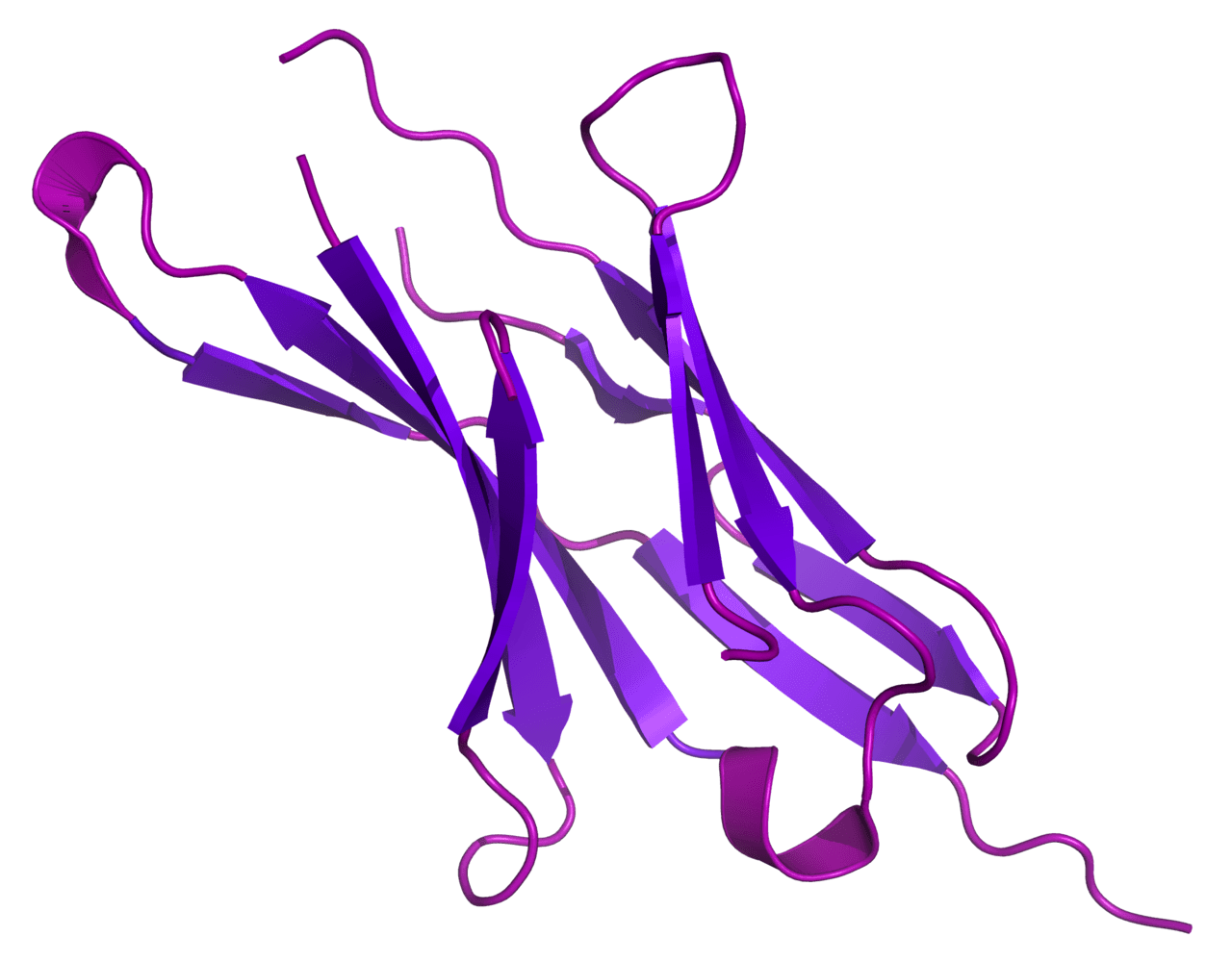All products and services are For Research Use Only and CANNOT be used in the treatment or diagnosis of disease.
Programmed cell death protein 1, also known as PD-1 and CD279 (cluster of differentiation 279), is a cell surface receptor that plays an important role in down-regulating the immune system and promoting self tolerance by suppressing T cell inflammatory activity. PD-1 is an immune checkpoint and guards against autoimmunity through a dual mechanism of promoting apoptosis (programmed cell death) in antigen specific T-cells in lymph nodes while simultaneously reducing apoptosis in regulatory T cells (anti-inflammatory, suppressive T cells). PD-L1, the ligand for PD1, is highly expressed in several cancers and hence the role of PD1 in cancer immune evasion is well established. Monoclonal antibodies targeting PD-1 that boost the immune system are being developed for the treatment of cancer. Many tumor cells express PD-L1, an immunosuppressive PD-1 ligand; inhibition of the interaction between PD-1 and PD-L1 can enhance T-cell responses in vitro and mediate preclinical antitumor activity. This is known as immune checkpoint blockade. A number of cancer immunotherapy agents that target the PD-1 receptor have been developed.
 Associated Disease
Associated Disease
 Loading...
Loading...
| CAT | Product Name | Target Species | Antibody Clone | Antibody Host | Receptor Construction | Vector Type | Targeting Cell Type | CAR Vector Type | Inquiry & Datasheet |
| XS-1022-ZP295 | Anti-PD-1 (PD1-0103) h(41BB-CD3ζ) CAR, pCDCAR1 | Human | PD1-0103 | Mouse | scFv-41BB-CD52ζ | Lentiviral vector | T cell | ||
| XS-1022-ZP296 | Anti-PD-1 (PD1-0103) h(CD28-CD3ζ) CAR, pCDCAR1 | Human | PD1-0103 | Mouse | scFv-CD28-CD52ζ | Lentiviral vector | T cell | ||
| XS-1022-ZP297 | Anti-PD-1 (PD1-F2) h(41BB-CD3ζ) CAR, pCDCAR1 | Mouse | PD1-F2 | Human | scFv-41BB-CD53ζ | Lentiviral vector | T cell | ||
| XS-1022-ZP298 | Anti-PD-1 (PD1-F2) h(CD28-CD3ζ) CAR, pCDCAR1 | Mouse | PD1-F2 | Human | scFv-CD28-CD53ζ | Lentiviral vector | T cell | ||
| XS-1022-ZP299 | Anti-PD-1 (PD1-17) h(41BB-CD3ζ) CAR, pCDCAR1 | Human | PD1-17 | Human | scFv-41BB-CD52ζ | Lentiviral vector | T cell | ||
| XS-1022-ZP300 | Anti-PD-1 (PD1-17) h(CD28-CD3ζ) CAR, pCDCAR1 | Human | PD1-17 | Human | scFv-CD28-CD52ζ | Lentiviral vector | T cell | ||
| XS-1022-ZP301 | Anti-PD-1 (PD1-0050) h(41BB-CD3ζ) CAR, pCDCAR1 | Human | PD1-0050 | Mouse | scFv-41BB-CD53ζ | Lentiviral vector | T cell | ||
| XS-1022-ZP302 | Anti-PD-1 (PD1-0050) h(CD28-CD3ζ) CAR, pCDCAR1 | Human | PD1-0050 | Mouse | scFv-CD28-CD53ζ | Lentiviral vector | T cell | ||
| XS-1022-ZP303 | Anti-PD-1 (PD1-0078) h(CD28-CD3ζ) CAR, pCDCAR1 | Human | PD1-0078 | Mouse | scFv-41BB-CD54ζ | Lentiviral vector | T cell | ||
| XS-1022-ZP305 | Anti-PD-1 (PD1-45D6) h(41BB-CD3ζ) CAR, pCDCAR1 | Human | PD1-45D6 | Human | scFv-41BB-CD53ζ | Lentiviral vector | T cell | ||
| XS-1022-ZP306 | Anti-PD-1 (PD1-45D6) h(CD28-CD3ζ) CAR, pCDCAR1 | Human | PD1-45D6 | Human | scFv-CD28-CD53ζ | Lentiviral vector | T cell | ||
| XS-1022-ZP307 | Anti-PD-1 (PD1-0069) h(41BB-CD3ζ) CAR, pCDCAR1 | Human | PD1-0069 | Mouse | scFv-41BB-CD54ζ | Lentiviral vector | T cell | ||
| XS-1022-ZP341 | Anti-PD-1 (H4H9048P2) h(41BB-CD3ζ) CAR, pCDCAR1 | Human | H4H9048P2 | Humanized | scFv-41BB-CD59ζ | Lentiviral vector | T cell | ||
| XS-1022-ZP342 | Anti-PD-1 (H4H9048P2) h(CD28-CD3ζ) CAR, pCDCAR1 | Human | H4H9048P2 | Humanized | scFv-CD28-CD59ζ | Lentiviral vector | T cell | ||
| XS-1022-ZP343 | Anti-PD-1 (76G5B3) h(41BB-CD3ζ) CAR, pCDCAR1 | Human | 76G5B3 | Human | scFv-41BB-CD60ζ | Lentiviral vector | T cell | ||
| XS-1022-ZP344 | Anti-PD-1 (76G5B3) h(CD28-CD3ζ) CAR, pCDCAR1 | Human | 76G5B3 | Human | scFv-CD28-CD60ζ | Lentiviral vector | T cell | ||
| XS-1022-ZP345 | Anti-PD-1 (NB01a) h(41BB-CD3ζ) CAR, pCDCAR1 | Human | NB01a | Mouse | scFv-41BB-CD61ζ | Lentiviral vector | T cell | ||
| XS-1022-ZP346 | Anti-PD-1 (NB01a) h(CD28-CD3ζ) CAR, pCDCAR1 | Human | NB01a | Mouse | scFv-CD28-CD61ζ | Lentiviral vector | T cell | ||
| XS-1022-ZP347 | Anti-PD-1 (MHC728) h(41BB-CD3ζ) CAR, pCDCAR1 | Human | MHC728 | Mouse | scFv-41BB-CD60ζ | Lentiviral vector | T cell | ||
| XS-1022-ZP348 | Anti-PD-1 (MHC728) h(CD28-CD3ζ) CAR, pCDCAR1 | Human | MHC728 | Mouse | scFv-CD28-CD60ζ | Lentiviral vector | T cell | ||
| XS-0823-LX82 | Anti-hPD-1 (AB) ICD(CD28-OX40-CD3ζ) CAR-MA, pAd5f35 Vector | Human | AB | Adenoviral vectors |
 NEWSLETTER
NEWSLETTER
The latest newsletter to introduce the latest breaking information, our site updates, field and other scientific news, important events, and insights from industry leaders
LEARN MORE NEWSLETTER NEW SOLUTION
NEW SOLUTION
CellRapeutics™ In Vivo Cell Engineering: One-stop in vivo T/B/NK cell and macrophage engineering services covering vectors construction to function verification.
LEARN MORE SOLUTION NOVEL TECHNOLOGY
NOVEL TECHNOLOGY
Silence™ CAR-T Cell: A novel platform to enhance CAR-T cell immunotherapy by combining RNAi technology to suppress genes that may impede CAR functionality.
LEARN MORE NOVEL TECHNOLOGY NEW SOLUTION
NEW SOLUTION
Canine CAR-T Therapy Development: From early target discovery, CAR design and construction, cell culture, and transfection, to in vitro and in vivo function validation.
LEARN MORE SOLUTION